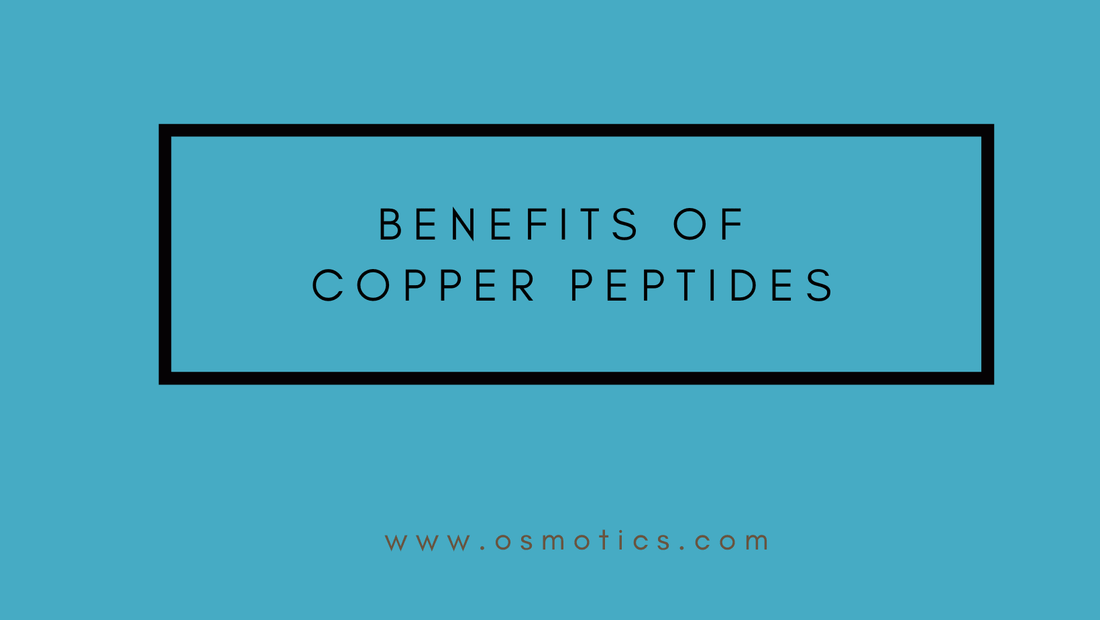
Copper Peptides: Benefits for Skin Care, and How to Use Them
Share
Copper Peptides: What Are They?
Natural tripeptides that bind copper (GHK-Cu) that promote healing and immunity are known as copper peptides. A tripeptide, which is made up of a short chain of amino acids joined by two or three peptide bonds, is a type of signaling protein that reacts to tissue injuries by inducing an immune response, promoting the creation of new blood vessels, and turning on anti-inflammatory compounds. Tripeptides promote the synthesis of elastin and collagen, two essential proteins that support the maintenance of skin's form and structure. Collagen production starts to decline as you age, which leads to the appearance of aging.
Laboratory-produced peptides closely resemble their naturally occurring counterparts; pharmaceutical businesses utilize them to create specific drugs, and the beauty sector employs them to create products that promote collagen creation.
Given that copper peptides act as an antioxidant, or chemical that fights free radicals in the body, their therapeutic actions may support skin health and hair growth. Copper peptides may help to increase the production of collagen and elastin, which may help to reduce fine lines, wrinkles, and sagging skin. Hyaluronic acid, which aids in hydrating and moisturizing the skin barrier, is one of the glycosaminoglycans that are produced more readily when copper peptides are present.
Skin Benefits: Copper Peptides
It increases collagen and elastin production.
The role of copper peptides is to promote the production of collagen and elastin, which can lead to a better texture, more firmness, and a decrease in the visibility of fine lines and wrinkles.
Protect Yourself from Free Radical Damage
The ingredient's antioxidant capabilities, which assist in brightening skin and preventing free radical damage, are another reason it frequently receives parallels to vitamin C. When your skin is subjected to dangerous environmental aggressors like UV rays or pollution, free radical damage takes the form of dark spots or early symptoms of ageing (such as fine lines). Free radicals are combated by antioxidants such as copper peptides, which promote luminous, supple skin.
Combat Inflammation
Copper also has anti-inflammatory properties that hasten wound healing and improve skin circulation. She says that because of its anti-inflammatory qualities, it can be used to treat scarring, hyperpigmentation, and inflammation-related redness.
Promote Hydration
Additionally, copper peptides support moisturised skin if the anti-inflammatory advantages, enhanced collagen formation, and antioxidant effects aren't enough. Copper peptides assist in increasing moisture by encouraging the synthesis of glycosaminoglycans, which are molecules that bind to water.
Tips for Using Copper Peptide Products
There are serums and moisturisers for the face that include copper peptides.
- Apply a small bit inside your elbow or behind your knee and wait 24 hours before using a new skincare product to check if there is any irritation in the area. This is known as a "patch test."
- Use moisturizers for your face by osmotics. Some facial moisturizers contain copper peptides, which help the skin maintain moisture by boosting the production of hyaluronic acid, a vital chemical.
- Choose serums, since
they include a high concentration of active components and can result in
quicker results, serums are the most frequent application for copper peptides.
- Certain eye lotions also contain copper peptides for firming the eye area. After cleansing and before moisturizing, apply a copper peptide serum to your skin.
- After cleansing, apply face lotion. To use a face lotion with copper peptides, just add a dime-sized amount of the moisturiser to clean, dry skin. The moisturiser should be applied in an even layer across your face.
- Keeping copper peptides separate from treatments containing vitamin C, glycolic acid, and retinol can increase the efficiency of the latter.
Are there any dangers or negative effects?
In general, copper peptides have minimal danger in cosmetics. However, peptide-containing products could come with some negative effects. As a general guideline, it's crucial to try any new skin care item before using it frequently on your face or scalp.
Apply a small amount of the product on the inside of your elbow and wait 24 hours to do a patch test. If any of the following indications of an allergic reaction appear, stop using the product immediately.:
- 1.Redness
- 2.Hives
- 3.It itches
- 4.burns
Another concern is copper toxicity, but using over-the-counter skin care products makes this unlikely. This is due to the likelihood that additional substances will be mixed in with the copper peptides in the final product.
The availability of copper peptides
Pay close attention to ingredient labels. Even though copper peptides may be listed as a component on a bottle, they may not really be the first thing on the ingredient list. Usually, the substances mentioned first are the ones that are used most frequently in the product, whereas the substances listed subsequently are used less frequently.
Additionally, search for key words like "copper tripeptide-1" or "GHK-Cu" to see whether a product actually contains copper peptides.
Osmotics offers numerous skincare products containing copper peptides.
Summary:
Copper peptides can reach the skin's deeper layers on your face and scalp, potentially promoting the production of collagen and elastin.
There may be further anti-aging effects as well, such as decreased inflammation and increased circulation.
More research is still required to find out if copper peptides are certain to encourage hair development and youthful skin.
If you want to incorporate copper peptides into your routine and you have certain hair or skin issues, consult a dermatologist.
